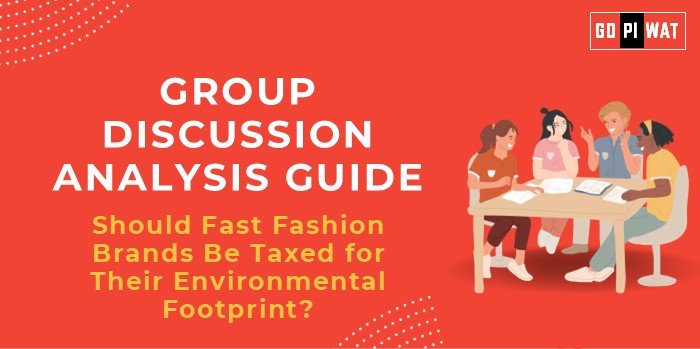📋 Group Discussion (GD) Analysis Guide
🌍 Should Fast Fashion Brands Be Taxed for Their Environmental Footprint?
🌟 Introduction to the Topic
Opening Context: Fast fashion is under scrutiny globally for its massive environmental impact, contributing to 10% of global greenhouse gas emissions and significant water pollution. With mounting concerns over sustainability, taxing these brands emerges as a possible deterrent.
Topic Background: The fast fashion model prioritizes cheap, rapid production of trends, often at the expense of environmental and ethical considerations. Countries like France have introduced extended producer responsibility laws targeting textile waste.
📊 Quick Facts and Key Statistics
- 🌍 Global Emissions: 10% of greenhouse gases are from the fashion industry (UNEP).
- 💧 Water Usage: Producing one cotton shirt requires approximately 2,700 liters of water.
- 🗑️ Waste Generation: 92 million tons of textile waste are generated annually (Ellen MacArthur Foundation).
- ♻️ Recycling Rates: Less than 1% of clothing is recycled into new garments.
- 🛍️ Consumer Habits: Fast fashion consumption doubled between 2000 and 2020.
👥 Stakeholders and Their Roles
- Governments: Legislate policies and impose taxes or subsidies for sustainable practices.
- Fashion Brands: Shift towards eco-friendly materials and circular production models.
- Consumers: Demand transparency and opt for sustainable alternatives.
- Nonprofits/NGOs: Raise awareness about the environmental cost of fast fashion.
- International Organizations: Set global standards for sustainable practices.
🏆 Achievements and Challenges
🌟 Achievements:
- 🌱 Rise of Sustainable Brands: Companies like Patagonia and Levi’s using recycled materials.
- 🔄 Circular Economy Initiatives: Exemplified by the Netherlands’ approach.
- 📈 Growing Consumer Awareness: Increased interest in sustainable fashion.
⚠️ Challenges:
- 💰 Economic Feasibility: Higher costs for sustainable practices may alienate price-sensitive customers.
- 🏛️ Regulatory Complexity: Globalized supply chains make enforcement difficult.
- 💡 Innovation Gaps: Limited scalability of eco-friendly technologies.
Global Comparisons:
- 🇫🇷 France: Anti-waste laws focusing on textiles.
- 🇺🇸 USA: Voluntary initiatives rather than mandated policies.
- 🇸🇪 Sweden: Textile recycling incentives supporting sustainability.
Case Studies:
- 🇫🇷 France: Eco-taxation on unsustainable textiles introduced in 2023.
- 🇧🇩 Bangladesh: Balancing economic dependency on fast fashion exports with sustainability efforts.
📑 Structured Arguments for Discussion
- Supporting Stance:
“Taxing fast fashion brands can curb environmental degradation by incentivizing sustainable practices.”
- Opposing Stance:
“Such taxes may disproportionately impact developing economies reliant on fast fashion exports.”
- Balanced Perspective:
“While taxation is a step forward, it must be paired with subsidies for sustainable innovation.”
✨ Effective Discussion Approaches
- Opening Approaches:
- 📊 Data-Backed: “The fashion industry’s 10% contribution to global emissions demands urgent action, including taxation.”
- ❓ Problem-Driven: “With 92 million tons of annual textile waste, how can governments effectively reduce fast fashion’s footprint?”
- Counter-Argument Handling:
- Example: “While taxation might increase costs for consumers, incentivizing brands to innovate can mitigate this impact.”
🔍 Strategic Analysis of Strengths and Weaknesses
- 💡 Strengths: Encourages eco-friendly innovation, aligns with global sustainability goals.
- ⚠️ Weaknesses: Potential economic fallout in textile-exporting countries, risks of greenwashing by brands.
- 📈 Opportunities: Growth of the sustainable fashion market, development of scalable recycling technologies.
- 🌋 Threats: Resistance from industry lobbies, loss of affordability for low-income groups.
🏫 Connecting with B-School Applications
- Real-World Applications:
- ♻️ Circular supply chains in operations management.
- 🌿 Sustainable branding strategies in marketing.
- ⚖️ Taxation policies as market disruptors in strategy.
- Sample Interview Questions:
- “What role should government taxation play in driving sustainability?”
- “Discuss the balance between economic growth and environmental protection in fast fashion.”
- Insights for B-School Students:
- 📘 Analyze global tax policies for scalability.
- 🌿 Research sustainable alternatives for fast fashion production.


